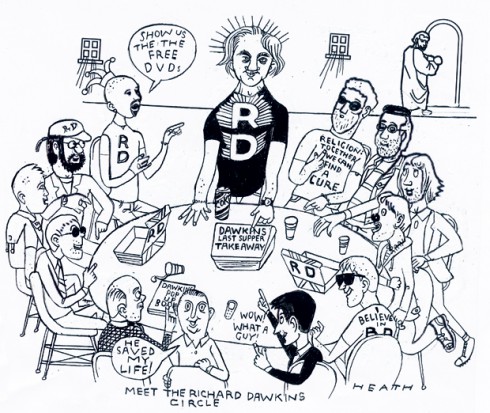Where to start with Prof Dawkins’ latest observations about religion and fundamentalism? In response to questions from an audience in Edinburgh where he was promoting his autobiography this week he observed that ‘nice’ religious people give credence to suicide bombers. It’s remarkable, really, that after a good eight years of debate and dialogue with people like Rowan Williams and Jonathan Sacks — viz, perfectly rational believers — he can still say the following:
‘…there is a sense in which the moderate, nice religious people – nice Christians, nice Muslims – make the world safe for extremists.
‘Because the moderates are so nice we all are brought up with the idea that there’s something good about religious faith. That there’s something good about bringing children up to have a faith.
‘Which means to believe something without evidence and without the need for justifying it.
‘They’re entitled simply to say “oh that’s my faith, I believe it, you’re not allowed to question it and you’re not allowed to ask me why I hold it”.
‘Once you teach people that that’s a legitimate reason for believing something then you as it were give a licence to the extremists who say ‘my belief is that I’m supposed to be a suicide bomber or I’m supposed to blow up buildings – it’s my faith and you can’t question that.’
Oh, but I think you can. In the first place the most stringent criticisms of the abuses of religion are by its mainstream members. There are any number of orthodox Muslims who will point out that the actions of suicide bombers and the latest manifestation of fundamentalism, the forces of the Islamic State in Iraq, run counter to some basic principles of Muslim moral theology, including the prohibition on suicide and the rules of law which prohibit the killing of women and children. This is not to gloss over the bellicose aspect of Islam and its history; it’s just to point out that there’s a very good critique of some of the more repugnant elements of modern Muslim fundamentalism from within mainstream Islam.
The second, more fundamental point is that religion is not inherently anti-rationalist, certainly not my lot, and certainly not mainstream Judaism, whose adherents are the least likely on earth to go for the notion of unquestioned truths and unquestioning belief. I belong to a tradition of Christianity – Catholicism – which sets a great deal of store by the notion of natural law, including the arguments for God from the nature of the world around us. And that holds good for those, like Cardinal Newman, who couldn’t see anything in Darwinism to disturb his concept of a created order. Actually I can’t think of anything less irrational than posing the question which underlies all religion: ‘why is there something rather than nothing?’ It’s a perfectly good question and one perfectly reasonable answer to it is God. It may not be an answer that R. Dawkins buys but it’s not inherently unreasonable.
In the third place, there is a natural association between religion in general, and Christianity in particular, and moral goodness. I never quite bought Brendan Behan’s query as to why it is that religious people are worse bastards than everyone else. On the contrary; I think you can say, Prof Dawkins, by your fruits you know them. The law based religions of Judaism and Islam have quite specific commandments and prohibitions that make for moral conduct. And if Christians are nice it may be because the faith is bound up in a person, viz, Christ, whose life and death was about us all having life more abundantly.
This is not, obviously, to suggest that all Christians are nice people but if you are, for instance, judged on the basis of treating the hungry and thirsty as if they were Christ himself, why, it concentrates the mind. I don’t mean me, obviously. I diminish the brand. But as Evelyn Waugh said, I’d be worse if I weren’t a Catholic.







Comments